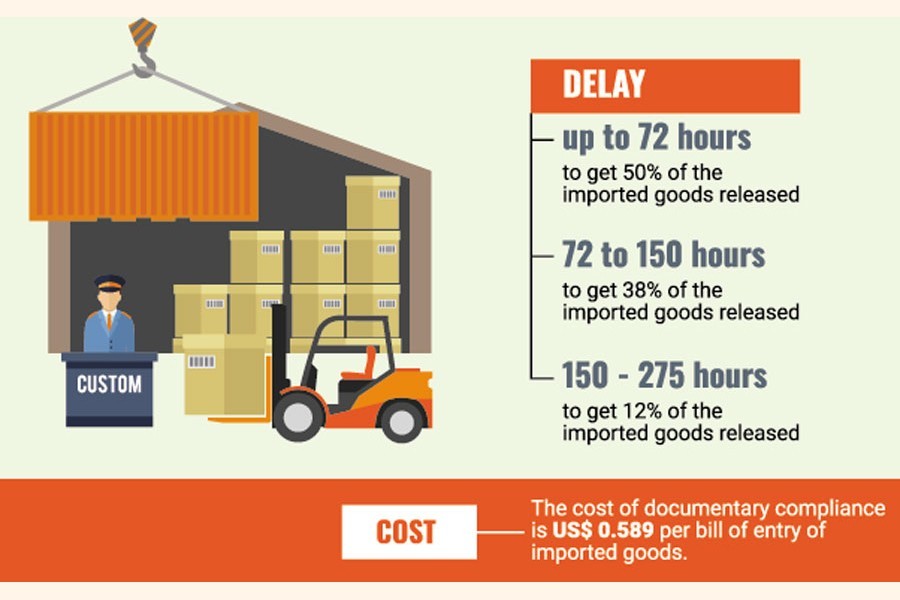
Published :
Updated :

Businesses are facing delay and counting higher costs while complying with customs documentation at the ports, although the authorities have made significant improvements in recent times.
In 50 per cent cases, it takes up to 72 hours to get the imported goods released, according to data from the customs and port authority.
However, in 38 per cent cases, importers need to spend 72 to 150 hours for documentary compliance.
In 12 per cent cases, between 150 and 275 hours are required for processing imported goods, said the data placed on the website Bangladesh Investment Development Authority (BIDA).
It also showed the cost of documentary compliance is US$ 0.589 for per bill of entry of imported goods.
The data showed the completion of documentary compliance for exports needs up to 24 hours while that of the border needs up to 22 hours.
However, exporters expressed reservations about the claim made by the customs and port authorities about the time and cost spent while releasing their goods,
They said it needs as many as 30 days to get imported products released from the ports.
Businesses also alleged some hidden costs were involved while getting their goods released from the ports. This pushes up the product prices at the consumers' end.
The data on cost and time of import-export was presented at a virtual meeting at the BIDA, chaired by the cabinet secretary Khondaker Anwarul Islam.
The latest meeting was held to highlight the development of the country's ease of doing business indicators.
Officials involved with investment promotion said the BIDA has not received positive signal from the private sector for the required time and cost of trading across border.
Importers said the Chattogram Custom House (CCH) and Chattogram Port Authority (CPA) should take initiative to reduce the time and cost of the trade through borders and ports to help them stay competitive.
Muhammed Abdus Salam, managing director of the A.T.S Apparels Ltd, said the existing time and costs needed for the release of goods in Bangladesh are much higher than those of the other regional rivals, including Vietnam.
In Vietnam, it takes 48 hours to enter the imported goods to the factory after releasing from the ships in customs ports, he said.
Mr Salam said there are some hidden costs involved in the documentary compliance in the port as VAT and other taxes are imposed on port charges.
According to the minutes of the meeting, the BIDA has decided to sensitise the trade groups of exporters, importers and freight forwarders about the accurate information of trading across the border.
Jibon Krishno Shaha Roy, a director of BIDA, said the state agency has fixed the target to slash cost and time at the port as stated by the customs and port authority.
At the last meeting of National Committee for Monitoring Implementation of Doing Business Reforms (NCMID), the stakeholders have decided to work on the implementation of the target.
Mr Roy said the BIDA would recommend the Internal Resources Division and the Shipping Ministry to disseminate the information relating to the reduction of time and cost and take required steps in this connection.
Amimul Ehsan Khan, first secretary of NBR, said customs is not alone responsible for the delay in trading across border as some 60 entities are involved with export-import trade.
"The customs authority has automated most of its functions, including e-payment but traders cannot reap benefit of this as other entities are yet to automate their activities," he said.
He held the data collection process of the World Bank responsible for the poor ranking of Bangladesh in its Ease of Doing Business report as.
"Customs has signed an agreement with 38 relevant entities to implement the National Single Window (NSW) project, which would allow the traders to get services under one roof," he added.
Masrur Reaz, chairman of Policy Exchange of Bangladesh, said an efficient and modern trade facilitation regime is vital for Bangladesh to diversify its export base and enhance competitiveness in global markets.
"Reforms targeted under trading across border under the World Bank's ranking can contribute significantly to attaining these goals," he said.
He, however, said it will be important to gauge user/beneficiary experience to assess whether reforms have been implemented effectively.
There are wider trade environment issues beyond cross-border commerce such as the bonded warehouse regime and trade policy modernisation, which need to be addressed for a better trade environment, he said.
According to a decision of the meeting, the Internal Resources Division (IRD) and the Shipping Ministry will work on giving permission for the submission of documents and its processing before the arrival of ships in the port.
To expedite import-export, both the wings will work towards conducting scrutiny before giving clearance of the products from the port.
doulot_akter@yahoo.com


 For all latest news, follow The Financial Express Google News channel.
For all latest news, follow The Financial Express Google News channel.